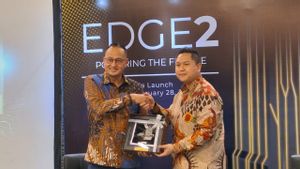JAKARTA - US Senator Richard Blumenthal stated that US semiconductor manufacturers should have done more ways to illegally prevent their chips from being used in equipment used by the Russian military. This he conveyed in a hearing on Tuesday, February 27.
Blumenthal's comments come as reports show that chips from the US and other technologies continue to be found in various Russian equipment on the battlefield in Ukraine. For example, ranging from drones and radio to guided missiles and armored vehicles.
His remarks were addressed to US chipmakers such as Advanced Micro Devices (AMD), Intel Corp, Texas Instruments, and Analog Devices, following reports of their products in Russian equipment or streaming to Russia, despite tight export controls from the US government.
The companies have the ability to track these components well enough to take further action, Blumenthal, chairman of the Senate's Permanent Subcommittee on Investigation. This he said, in a hearing that examined how US chipmakers adhered to export restrictions imposed after the Russian invasion in February 2022.
The subcommittee has requested documents and information from the four chipmakers. Preliminary data show a significant increase since 2021 in exports to countries that Russia may use to evade controls, according to memos from the committee's majority staff.
The three witnesses who testified in the hearing explained how their organization had tracked the use of US chips and components in Russian weapons.
mbalian Spleeters of Conflict Armament Research, a UK-based organization, said that "Russia acquired chips through identifiable third-state distributors."
Elina Ribakova of the Kyiv School of Economics said these components tend to be produced in places such as China, Malaysia, and the Philippines, and reach Russia through Turkey, the United Arab Emirates, and countries bordering Russia.
Senator Ron Johnson, a member of the subcommittee's top ranking, argues that sanctions will always be avoided. "You close one hole, another hole will open," he said.
SEE ALSO:
Intel says its contracts require customers and distributors to comply with regulations, and that they are working to track and address potential distributor problems.
AMD said it "supports efforts to strengthen public/private partnerships to counter unauthorized product diversion." The company said it was taking action when AMD products were diverted, and was working with global customs and other parties to stop illegal shipments.
Texas Instruments said they invested "significant time and resources" to keep their chips "not falling into the hands of criminals."
Analog Devices said it had taken "significant and proactive measures to reduce the risk of the gray market." The company said it was serious about fighting illegal diversions and working with law enforcement, government agencies, and other parties to take appropriate action.
The English, Chinese, Japanese, Arabic, and French versions are automatically generated by the AI. So there may still be inaccuracies in translating, please always see Indonesian as our main language. (system supported by DigitalSiber.id)

















